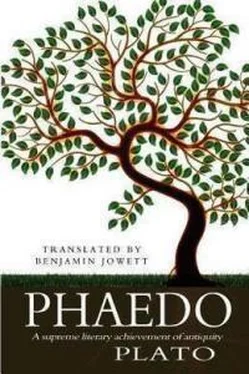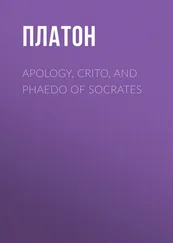Платон - Phaedo
Здесь есть возможность читать онлайн «Платон - Phaedo» весь текст электронной книги совершенно бесплатно (целиком полную версию без сокращений). В некоторых случаях можно слушать аудио, скачать через торрент в формате fb2 и присутствует краткое содержание. Год выпуска: 2014, Издательство: epubBooks Classics, Жанр: Философия, на английском языке. Описание произведения, (предисловие) а так же отзывы посетителей доступны на портале библиотеки ЛибКат.
- Название:Phaedo
- Автор:
- Издательство:epubBooks Classics
- Жанр:
- Год:2014
- ISBN:нет данных
- Рейтинг книги:3 / 5. Голосов: 1
-
Избранное:Добавить в избранное
- Отзывы:
-
Ваша оценка:
- 60
- 1
- 2
- 3
- 4
- 5
Phaedo: краткое содержание, описание и аннотация
Предлагаем к чтению аннотацию, описание, краткое содержание или предисловие (зависит от того, что написал сам автор книги «Phaedo»). Если вы не нашли необходимую информацию о книге — напишите в комментариях, мы постараемся отыскать её.
Phaedo — читать онлайн бесплатно полную книгу (весь текст) целиком
Ниже представлен текст книги, разбитый по страницам. Система сохранения места последней прочитанной страницы, позволяет с удобством читать онлайн бесплатно книгу «Phaedo», без необходимости каждый раз заново искать на чём Вы остановились. Поставьте закладку, и сможете в любой момент перейти на страницу, на которой закончили чтение.
Интервал:
Закладка:
I should very much like to hear, he replied.
Socrates proceeded:—I thought that as I had failed in the contemplation of true existence, I ought to be careful that I did not lose the eye of my soul; as people may injure their bodily eye by observing and gazing on the sun during an eclipse, unless they take the precaution of only looking at the image reflected in the water, or in some similar medium. So in my own case, I was afraid that my soul might be blinded altogether if I looked at things with my eyes or tried to apprehend them by the help of the senses. And I thought that I had better have recourse to the world of mind and seek there the truth of existence. I dare say that the simile is not perfect—for I am very far from admitting that he who contemplates existences through the medium of thought, sees them only 'through a glass darkly,' any more than he who considers them in action and operation. However, this was the method which I adopted: I first assumed some principle which I judged to be the strongest, and then I affirmed as true whatever seemed to agree with this, whether relating to the cause or to anything else; and that which disagreed I regarded as untrue. But I should like to explain my meaning more clearly, as I do not think that you as yet understand me.
No indeed, replied Cebes, not very well.
There is nothing new, he said, in what I am about to tell you; but only what I have been always and everywhere repeating in the previous discussion and on other occasions: I want to show you the nature of that cause which has occupied my thoughts. I shall have to go back to those familiar words which are in the mouth of every one, and first of all assume that there is an absolute beauty and goodness and greatness, and the like; grant me this, and I hope to be able to show you the nature of the cause, and to prove the immortality of the soul.
Cebes said: You may proceed at once with the proof, for I grant you this.
Well, he said, then I should like to know whether you agree with me in the next step; for I cannot help thinking, if there be anything beautiful other than absolute beauty should there be such, that it can be beautiful only in as far as it partakes of absolute beauty—and I should say the same of everything. Do you agree in this notion of the cause?
Yes, he said, I agree.
He proceeded: I know nothing and can understand nothing of any other of those wise causes which are alleged; and if a person says to me that the bloom of colour, or form, or any such thing is a source of beauty, I leave all that, which is only confusing to me, and simply and singly, and perhaps foolishly, hold and am assured in my own mind that nothing makes a thing beautiful but the presence and participation of beauty in whatever way or manner obtained; for as to the manner I am uncertain, but I stoutly contend that by beauty all beautiful things become beautiful. This appears to me to be the safest answer which I can give, either to myself or to another, and to this I cling, in the persuasion that this principle will never be overthrown, and that to myself or to any one who asks the question, I may safely reply, That by beauty beautiful things become beautiful. Do you not agree with me?
I do.
And that by greatness only great things become great and greater greater, and by smallness the less become less?
True.
Then if a person were to remark that A is taller by a head than B, and B less by a head than A, you would refuse to admit his statement, and would stoutly contend that what you mean is only that the greater is greater by, and by reason of, greatness, and the less is less only by, and by reason of, smallness; and thus you would avoid the danger of saying that the greater is greater and the less less by the measure of the head, which is the same in both, and would also avoid the monstrous absurdity of supposing that the greater man is greater by reason of the head, which is small. You would be afraid to draw such an inference, would you not?
Indeed, I should, said Cebes, laughing.
In like manner you would be afraid to say that ten exceeded eight by, and by reason of, two; but would say by, and by reason of, number; or you would say that two cubits exceed one cubit not by a half, but by magnitude?–for there is the same liability to error in all these cases.
Very true, he said.
Again, would you not be cautious of affirming that the addition of one to one, or the division of one, is the cause of two? And you would loudly asseverate that you know of no way in which anything comes into existence except by participation in its own proper essence, and consequently, as far as you know, the only cause of two is the participation in duality—this is the way to make two, and the participation in one is the way to make one. You would say: I will let alone puzzles of division and addition—wiser heads than mine may answer them; inexperienced as I am, and ready to start, as the proverb says, at my own shadow, I cannot afford to give up the sure ground of a principle. And if any one assails you there, you would not mind him, or answer him, until you had seen whether the consequences which follow agree with one another or not, and when you are further required to give an explanation of this principle, you would go on to assume a higher principle, and a higher, until you found a resting–place in the best of the higher; but you would not confuse the principle and the consequences in your reasoning, like the Eristics—at least if you wanted to discover real existence. Not that this confusion signifies to them, who never care or think about the matter at all, for they have the wit to be well pleased with themselves however great may be the turmoil of their ideas. But you, if you are a philosopher, will certainly do as I say.
What you say is most true, said Simmias and Cebes, both speaking at once.
ECHECRATES: Yes, Phaedo; and I do not wonder at their assenting. Any one who has the least sense will acknowledge the wonderful clearness of Socrates' reasoning.
PHAEDO: Certainly, Echecrates; and such was the feeling of the whole company at the time.
ECHECRATES: Yes, and equally of ourselves, who were not of the company, and are now listening to your recital. But what followed?
PHAEDO: After all this had been admitted, and they had that ideas exist, and that other things participate in them and derive their names from them, Socrates, if I remember rightly, said:—
This is your way of speaking; and yet when you say that Simmias is greater than Socrates and less than Phaedo, do you not predicate of Simmias both greatness and smallness?
Yes, I do.
But still you allow that Simmias does not really exceed Socrates, as the words may seem to imply, because he is Simmias, but by reason of the size which he has; just as Simmias does not exceed Socrates because he is Simmias, any more than because Socrates is Socrates, but because he has smallness when compared with the greatness of Simmias?
True.
And if Phaedo exceeds him in size, this is not because Phaedo is Phaedo, but because Phaedo has greatness relatively to Simmias, who is comparatively smaller?
That is true.
And therefore Simmias is said to be great, and is also said to be small, because he is in a mean between them, exceeding the smallness of the one by his greatness, and allowing the greatness of the other to exceed his smallness. He added, laughing, I am speaking like a book, but I believe that what I am saying is true.
Simmias assented.
I speak as I do because I want you to agree with me in thinking, not only that absolute greatness will never be great and also small, but that greatness in us or in the concrete will never admit the small or admit of being exceeded: instead of this, one of two things will happen, either the greater will fly or retire before the opposite, which is the less, or at the approach of the less has already ceased to exist; but will not, if allowing or admitting of smallness, be changed by that; even as I, having received and admitted smallness when compared with Simmias, remain just as I was, and am the same small person. And as the idea of greatness cannot condescend ever to be or become small, in like manner the smallness in us cannot be or become great; nor can any other opposite which remains the same ever be or become its own opposite, but either passes away or perishes in the change.
Читать дальшеИнтервал:
Закладка:
Похожие книги на «Phaedo»
Представляем Вашему вниманию похожие книги на «Phaedo» списком для выбора. Мы отобрали схожую по названию и смыслу литературу в надежде предоставить читателям больше вариантов отыскать новые, интересные, ещё непрочитанные произведения.
Обсуждение, отзывы о книге «Phaedo» и просто собственные мнения читателей. Оставьте ваши комментарии, напишите, что Вы думаете о произведении, его смысле или главных героях. Укажите что конкретно понравилось, а что нет, и почему Вы так считаете.










